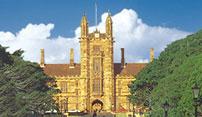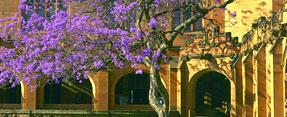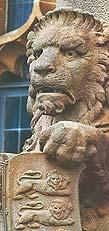Study Linguistics at the University of Sydney

The study of language, discourse, and communication
Master of Arts (Applied Linguistics)
Graduate Certificate (Applied Linguistics)
Graduate Diploma (Applied Linguistics)
The MA in Applied Linguistics is suitable for those interested in understanding the process behind the teaching and learning of a second language: that is for those involved in the teaching of English to speakers of other languages (TESOL), second language teaching (SLT), or the teaching of modern languages, particularly Korean and Japanese, as well as any other aspect of language education. The Master of Arts in Applied Linguistics is designed for those interested in the application of linguistics in educational and other professional areas.
The Department of Linguistics offers an innovative Applied Linguistics curriculum with a particular focus on discourse and sociolinguistics. While still delivering the more traditional areas of TESOL and language teaching, our program offers a contemporary introduction to the fields of TESOL and SLT that is informed by systemic-functionalist, poststructuralist and critical approaches to Applied Linguistics.
Applied Linguistics is a fast-growing area of and there is considerable demand for suitably qualified candidates all around the world in all areas of education including university teaching. Many graduates of our Masters degree in Applied Linguistics go on to pursue a research degree
Additional entry requirements for all coursework programs in Applied Linguistics
In addition to the BA degree, a professional qualification (e.g., a teaching diploma) and relevant professional experience is required. Evidence of these requirements must be submitted with your application.
Course structure
The Graduate Certificate consists of 3 compulsory core units of study (marked 'c' below) and 1 elective unit.
The Graduate Diploma consists of 4 compulsory core units and 2 elective units.
The Master of Arts (Applied Linguistics) consists of 4 compulsory core units of study as well as 4 electives.
Core Units of Study:
LNGS7001 c Language Analysis
LNGS7272 Additional Lang Learning: TESOL/SLT/LOTE
LNGS7002 c Sociolinguistics
LNGS7273 c Additional Lang Teaching: TESOL/SLT/LOTE
The additional elective units may be taken from the list of units shown below. Not all units are offered each year.
Elective Units of Study
7003 Pragmatic Grammar of English
7004 Register and Genre in English
7005 Semantics and Pragmatics
7006 Cross-Cultural Communication
7009 Language for Specific Purposes
7101 Bilingualism
7102 Educational Linguistics
7103 Translation
7104 Language Testing
7105 Language and Culture
7106 Field Methods
7107 Introduction to Language and the Law
7109 Language and Identity
7110 Ethnographic Approaches to Literacy
7112 Language Policy and Planning
7113 Classroom Based Research
7274 Media Discourse
7521 Essay 1*
7528 Dissertation Part 1*
7529 Dissertation Part 2*
7539 Japanese Linguistics 1
7540 Japanese Linguistics 2
7541 Japanese Linguistics 3
7557 Supervised Reading Course*
7561 Korean Linguistics 1
7562 Korean Linguistics 2
*Note: Students intending to enrol in LNGS7521 Essay or LNGS7528 and LNGS7529 Dissertation Parts 1 and 2 or LNGS7557 Supervised Reading Course must consult the Postgraduate Coordinator prior to enrolment.
The department of Linguistics also recommends that students take the following non credit courses offered by the Learning Centre: Critical Reading (6 hours), Essay Writing (12 hours)

Master of Arts (Cross Cultural Communication)
Coordinator: Prof William Foley
ling.enquiries@arts.usyd.edu.au
The MA program in Cross-cultural Communication is suitable for those already working in, or interested in a career in professional, administrative or management sectors as well as in educational contexts where people from different backgrounds interact on a regular basis.
Cross-Cultural Communication is an exciting new field of study gaining in importance in today's ever more globalised and multicultural world. The Masters degree in Cross-Cultural Communication is designed for those interested in applying sociolinguistic and discourse-analytic approaches to studying cross-cultural communication. The program provides an introduction to potential pitfalls in cross-cultural communication, but its main focus is on the immense creative potential of the area and on the management of cross-cultural communication.
Course structure
The Master of Arts (Cross-Cultural Communication) consists of 3 core units of study and 5 electives.
LNGS7001 Language Analysis
LNGS7002 Sociolinguistics
LNGS7006 Cross-Cultural Communication
A basic grounding in linguistics is provided by the two core units Language Analysis and Sociolinguistics, so that the specific linguistic problems involved in cross cultural communication can be seen in their wider context. The third core unit, Cross Cultural Communication, then focuses on the central topics of cross cultural communication, its chances and problems, and approaches to their analysis. The remaining 5 elective units allow students to concentrate on areas such as language and identity, gender, genre, or literacy that have been found to be of particular importance to the construction of cultural categories and communication.
Elective Units of Study
7003 Pragmatic Grammar of English
7004 Register and Genre in English
7005 Semantics and Pragmatics
7006 Cross-Cultural Communication
7009 Language for Specific Purposes
7101 Bilingualism
7102 Educational Linguistics
7103 Translation
7105 Language and Culture
7106 Field Methods
7107 Introduction to Language and the Law
7109 Language and Identity
7110 Ethnographic Approaches to Literacy
7112 Language Policy and Planning
7274 Media Discourse
7521 Essay 1*
7528 Dissertation Part 1*
7529 Dissertation Part 2*
7557 Supervised Reading Course*
*Note: Students intending to enrol in LNGS7521 Essay or LNGS7528 and LNGS7529 Dissertation Parts 1 and 2 or LNGS7557 Supervised Reading Course must consult the Postgraduate Coordinator prior to enrolment.
The department of Linguistics also recommends that students take the following non credit courses offered by the Learning Centre: Critical Reading (6 hours), Essay Writing (12 hours)
CONTACT
Address:
Faculty of Arts Office
Main Quadrangle A14
The University of Sydney
NSW 2006 - Australia
Tel: (61-2) 9351 3129
Fax: (61-2) 9351 2045
Email:
Dr Ingrid Piller
ling.enquiries@arts.usyd.edu.au
Prof William Foley
ling.enquiries@arts.usyd.edu.au
Website: arts.usyd.edu.au/departs/linguistics

| |

|



